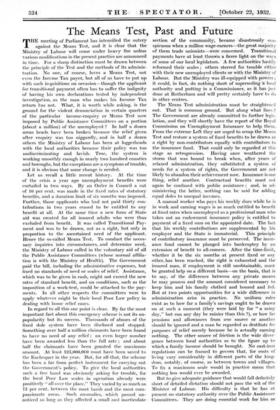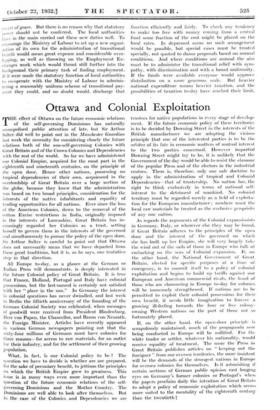The Means Test, Past and Future
THE meeting of Parliament has intensified the outcry against the Means Test, and it is clear that the Ministry of Labour will come under heavy fire unless various modifications in the present practice are announced in time. For a sharp distinction must be drawn between the principle of the Test and the methods of its adminis- tration. No one, of course, loves a Means Test, not even the Income Tax payer, but all of us have to put up with such inquisitions on oceasion—though the applicant for transitional payment often has to suffer the indignity of having his own declarations tested by independent investigation, as the man who makes his Income Tax return has not. What, it is worth while asking, is the ground for the violent denunciation in .certain quarters of the particular income-enquiry or Means Test now imposed by Public Assistance Committees on a portion (about a million) of the unemployed ? In half a dozen areas heads have been broken because the relief given after enquiry was too niggardly, and in half a dozen others the Ministry of Labour has been at loggerheads with the local authorities because their policy was too undiscriminating and lavish. True, the system is working smoothly enough in nearly two hundred counties and boroughs, but the exceptions are a symptom of trouble; and it is obvious that some change is needed.
Let us recall a little recent history. At the time of the crisis a year ago unemployment benefits were curtailed in two ways. By an Order in Council a cut of 10 per cent. was made in the fixed rates of statutory benefits, and a duration limit of six months was imposed. Further, those applicants who had not paid thirty con- tributions in two years ceased to be entitled to any benefit at all. At the same time a new form of State aid was created for all insured adults who were thus excluded from benefit. It was called Transitional Pay- ment and was to be drawn, not as a right, but only in proportion to the ascertained need of the applicant. Hence the so-called Means Test. To conduct the necesa sary inquiries into circumstances, and determine need, the Ministry of Labour called in the voluntary aid of all the Public Assistance Committees (whose normal affilia-' tion is with the Ministry of Health). The Government paid the bill, including the administrative expenses, but fixed no standards of need or scales of relief. Assistance, which was to be given in cash, might not exceed the new rates of standard benefit, and no conditions, such as the imposition of a work-test, could be attached to the pay-' ments. In all other respects the committees were to apply whatever might be their local Poor Law policy in dealing with home relief cases.
In regard to all this one point is clear. By far the most important fact about this emergency scheme is not its un- popularity but its success. Thousands of abuses of the fixed dole system have been disclosed and stopped. Something over half a million claimants have been- found to have no need of any relief ; an even larger number have been awarded less than the full rate ; and about half the claimants have been granted the maximum. amount. At least 125,000,000 must have been saved to the Exchequer in the year. But, for all that, the scheme has been a far from perfect instrument for carrying out the Government's policy. To give the local authorities such a free hand was obviously asking for trouble, for the local Poor Law scales in operation already were positively " all over the place." They varied by as much as 75 per cent. between the most harsh and the most com- passionate areas.- - Such anomalies, -which passed un- noticed so long as they affected a small and inarticulate- section of the community, became 'disastrously con- spicuous when a million wage-earners—the great majority of them trade unionists—were concerned. Transitional payments have at least throiin .a fierce light on-the ways of some of our local legislators. " A few authorities hastily reformed their scales ; otherS steered kir trouble either with their new unemployed clients or with the Ministry of Labour. But the Ministry was ill-equipped With powers ; it could, :in fact, -do nothing short of supersedid0- local authority and putting in a Commissioner, as it has just done at Rotherham and will pretty certainly have to do in other centres.
The Means Test administration must be straightened out. That is common -ground. 'But' along what lines ? The Government are already committed to further legis- lation, and they will shortly have the report of the Royal Commission on Unemployment Inhurance to help them. From the extreme Left they are urged to scrap the Mean's Test and restore a system of fixed benefits to be drawn as a right by non-contributors equally with contributors to the insurance fund. That could only be regarded at this stage as retrogression. Having once weathered the storm that was bound to break when; after years of relaxed administration, they sUbstituted a system of needs for a' system of rights, the GoVernment are not likely to abandon their achievement now. Insurance is one thing, relief another. Contractual benefiti must not again be confused with public assistance ; and, in ad- ministering the latter, nothing can be said for adding equal doles to unequal incomes.
A manual worker who pays his weekly dues while he is in work and earning wages is as much entitled to benefit at fixed rates when unemployed as a professional man who takes out an endowment insurance policy is entitled to payment of a fixed sum on the appointed date. The fact that his weekly contributions are supplemented by his employer and the State is immaterial. This principle of contributory insurance must be preserved. The insur- ance fund cannot be plunged into bankruptcy by an extension of benefit to all-corners. After the time-limit, whether it be the six months at present fixed or any other, has been reached, the right is exhausted and the insured man, if employment is still unobtainable, must be granted help on a different basis—on the basis, that is to say, of the difference between any private means he may possess and the amount considered necessary to keep him and his family clothed and housed and fed. But at two points opportunities for a wide difference in administration arise in practice. No uniform rules exist as to how far a family's savings ought to be drawn on at such a moment (they were laid by for " a rainy day," but can any day be rainier than this ?), or hOw far pensions and allowances from one' source or another should be ignored and a man be regarded as destitute for purposes of relief merely because he is actually earning nothing. The other source of friction is the wide diver gence between loeal authorities as to the figure up to which a faMily income should be brought. No cast-iron regulations can be framed to govern that, for costs of living vary considerably in different parts of the king- dom, notably,- of course, as between towns and -villages. To fix a maximum scale would in practice mean that nothing less would ever be awarded.
But to give adequate guidance that would fall definitely short of detailed- dictation should not pass the wit of the Minister of Labour: His -difficulty is that he. has at present no statutory authority oVer-the Public Assistance Committees: They are doing. essential -work for him as an act of grace. But there is no reason 'Why that statutory power should not be conferred. The local authorities. have in the main carried out these new duties well. To encourage the Ministry of Labour to set up a new organi, ration of its own for the administration of transitional benefit would mean great expense and considerable over: hipping, as well as throwing on the Employment Ex- changes work _which would thrust still further into the background their primary task of finding employment, If it.were made the statutory function of local authorities to co-operate with the Ministry of Labour in adminis- tering a reasonably uniform scheme of transitional pay- ment they could, and no doubt would, discharge that function efficiently and fairly. To -cheek any tendency to - make too free with- money coming from a central fund _smile fraction of the cost might be placed on the local rates. In depressed areas no such .arrangement would be possible, but special cases must be treated specially, not quoted to damn proposals based on normal conditions. And where conditions are normal the aim must be to administer the transitional relief with syni-. pathy, with discrimination and with a broad uniformity. If the funds were available everyone would approve distribution on a more generous scale.. But heavier national expenditure means heaVier taxation, and the possibilities of taxation to-day have reached their limit.















































 Previous page
Previous page